郑州市七年级英语下册Unit11Howwasyourschooltrip重难点归纳
七年级英语下册Unit 11 How was your school trip超全重要短语和句子(英汉対译)
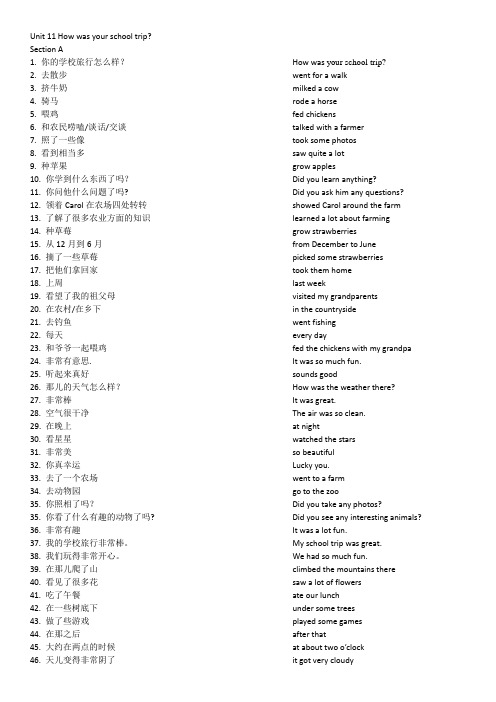
Unit 11 How was your school trip?Section A1. 你的学校旅行怎么样?How was your school trip?2. 去散步went for a walk3. 挤牛奶milked a cow4. 骑马rode a horse5. 喂鸡fed chickens6. 和农民唠嗑/谈话/交谈talked with a farmer7. 照了一些像took some photos8. 看到相当多saw quite a lot9. 种苹果grow apples10. 你学到什么东西了吗?Did you learn anything?11. 你问他什么问题了吗? Did you ask him any questions?12. 领着Carol在农场四处转转showed Carol around the farm13. 了解了很多农业方面的知识learned a lot about farming14. 种草莓grow strawberries15. 从12月到6月from December to June16. 摘了一些草莓picked some strawberries17. 把他们拿回家took them home18. 上周last week19. 看望了我的祖父母visited my grandparents20. 在农村/在乡下in the countryside21. 去钓鱼went fishing22. 每天every day23. 和爷爷一起喂鸡fed the chickens with my grandpa24. 非常有意思. It was so much fun.25. 听起来真好sounds good26. 那儿的天气怎么样?How was the weather there?27. 非常棒It was great.28. 空气很干净The air was so clean.29. 在晚上at night30. 看星星watched the stars31. 非常美so beautiful32. 你真幸运Lucky you.33. 去了一个农场went to a farm34. 去动物园go to the zoo35. 你照相了吗?Did you take any photos?35. 你看了什么有趣的动物了吗? Did you see any interesting animals?36. 非常有趣It was a lot fun.37. 我的学校旅行非常棒。
郑州市七年级英语下册Unit11Howwasyourschooltrip笔记重点大全

郑州市七年级英语下册Unit11Howwasyourschooltrip笔记重点大全单选题1、They ________ their homework yesterday.A.didn’tB.don’tC.didn’t doD.don’t do答案:C句意:昨天他们没有做作业。
考查一般过去时态。
根据“yesterday”可知是一般过去时态,句子谓语动词为实意动词do,否定句借助助动词do 的变形didn’t,助动词后加实意动词原形。
故选C。
2、—The little mouse in a red hat is really ________. Who painted it?—Tom did. He is good at painting.A.lovelyB.easyC.cheapD.ugly答案:A句意:——戴红帽子的小老鼠真可爱。
谁画的?——汤姆画的。
他擅长画画。
考查形容词辨析。
lovely可爱的;easy容易的;cheap便宜的;ugly丑陋的。
根据下句“He is good at painting.”可推知,应是小老鼠很可爱。
故选A。
3、Thanks for giving me ________help.A.so muchB.so manyC.such muchD.such many答案:A句意:谢谢你给我这么多帮助。
考查形容词短语。
“这么多”只能说“so much/so many ”,不能说“such much/many ”;so much修饰不可数名词,so many修饰可数名词复数。
Helpa(帮助)是不可数名词,故用so much;选A。
4、He has some ________ and I have some ________.A.egg; saladB.tomatoes; pearC.ice-cream; appleD.strawberries; milk答案:D句意:他有一些草莓,我有一些牛奶。
人教新目标版七年级英语下册Unit11Howwasyourschooltrip优质教案
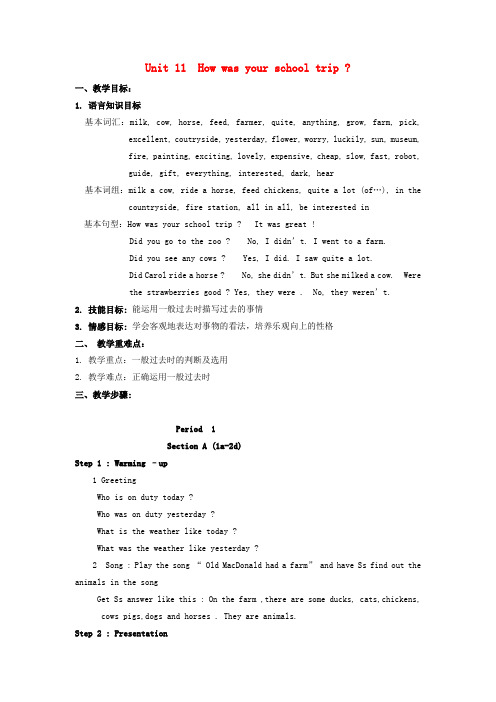
Unit 11 How was your school trip ?一、教学目标:1. 语言知识目标基本词汇:milk, cow, horse, feed, farmer, quite, anything, grow, farm, pick, excellent, coutryside, yesterday, flower, worry, luckily, sun, museum,fire, painting, exciting, lovely, expensive, cheap, slow, fast, robot,guide, gift, everything, interested, dark, hear基本词组:milk a cow, ride a horse, feed chickens, quite a lot (of…), in the countryside, fire station, all in all, be interested in基本句型:How was your school trip ? It was great !Did you go to the zoo ? No, I didn’t. I went to a farm.Did you see any cows ? Yes, I did. I saw quite a lot.Did Carol ride a horse ? No, she didn’t.But she milked a cow. Were the strawberries good ? Yes, they were . No, they weren’t.2. 技能目标: 能运用一般过去时描写过去的事情3. 情感目标:学会客观地表达对事物的看法,培养乐观向上的性格二、教学重难点:1. 教学重点:一般过去时的判断及选用2. 教学难点:正确运用一般过去时三、教学步骤:Period 1Section A (1a-2d)Step 1 : Warming –up1 GreetingWho is on duty today ?Who was on duty yesterday ?What is the weather like today ?What was the weather like yesterday ?2 Song : Play the song “ Old MacDonald had a farm” and have Ss find out the animals in the songGet Ss answer like this : On the farm ,there are some ducks, cats,chickens, cows pigs,dogs and horses . They are animals.Step 2 : Presentation1 Show a picture and tell Ss: This is also a farm. Last week Carol and his classmates had a school trip. They went to the farm. What did they do on the farm? How was their school trip?2 Show some pictures again and try to get the past tense verbs expressions according to the pictures.(1) Show the picture and the question(2) Ask one student to answer the question.(3) All students read it toghter.Q:Did he ride a horse?A:Yes, he did. He rode a horse.Q:Did he milk a cow?A:Yes, he did. He milked a cow.Q:Did he ride a horse?A :No, he didn’t .Did he feed chickens?Yes, he did. He fed chickens.Did you go to the zoo?No, I didn’t. I went to a farm.Did you see any cows ?Yes, I did. I saw quite a lot.Did they pick any strawberries on the farm ?Yes, they did .How were the strawberries?They were delicious.Were the strawberries good?Yes, they were.No, they weren’t.How was your school trip ?It was great.Were the strawberries good ?Yes ,they were.No, they weren’t.Step 3 ExercisesStep 4 : Practice (Listening and speaking)1a Match the phrses with the pictures.1b Listen and circle the three things Carol did on her school trip in 1a.1c Ask and an swer questions about Carol’s school trip.2a Listen and check the questions you hear.2b Listen again.Circle T for true or F for false2c Ask and answer questions about Carol’s visit to the farm.Step 5 :Tasks:1 Look at the pictures and practice the dialogueA:How was your school trip?B: It was …(boring/interesting/good/great…)A:What did you do on the school trip ?B:I went for a walk with my classmates.2 2d Role-play the conversation3.Groupwork: Make a survey. Ask your partners what they didlast week. Then give a reporter.Step 6 : Grammar Focus ( Get Ss read aloud )How was your school trip ? It was great !Did you go to the zoo ? No, I didn’t. I went to a farm.Did you see any cows ? Yes, I did. I saw quite a lot.Did Carol ride a horse ? No, she didn’t. But she milked a cow.Were the strawberries good ? Yes, they were . No, they weren’t.Step 6 Summary and Language pointsStep 7 Exercises :Period 2Section A (Grammar Focus-3b)Step 1:1 GreetingHow are you today ?How were you yesteday ?How was your last school trip ?2 Free talk :T : Do you want to know something about your classmates’ school trip ?Now Ask your partner :What did you do on your school trip ? Then fillin the following chart.Step 2 :Pre-task :1.Look at the pictures and fill in the blanks.2.Write the past forms of the following verbs.3. Check the past forms .Then ask Ss to summerize the rules of past forms ofthe regular verbs.Then explain the rules of past forms of the regular verbsStep 3 While-task 3a1 Ask Ss to read the letters in 3a .2 Ask Ss to complete Jim’s letter on the left and Bill’s reply on the right.3 Check the answers .Ask Ss to pay attention to the past tenst verbs.4 Explain the language points5 Read the letters together.Step 4: Post-task1. Challenge:Ask Ss to fill in the blanks according to the pictures.2 Check the answers. Ask Ss to read the answers one by one.3 Have a student read the letter out aloud.4 Ask Ss to read the letter several times. Try to recite it.5 Groupwork: Make up a story. Each student adds a sentence.If he or she can’tadd a sentenec .He or she must sing an English song.You can begin like this:Last week I visited my aunt’s house.____________________________________________________________________________________________________________________________Step 5 Language points and ExercisesPeriod 3Section B (1a-2c)Step 1:1 GreetingWhat did you do yesterday ?How were you yesterday ?2 Review: GamesUse your imagation and make up a story. Each student adds a sentence.If he or she can’t add a sentence,h e or she must sing an English song.Step 2 :Preparation 1a1 Match the activities with the pictures.2 Check the answersStep 2 :Listening 1b 1c1 Listen and answer the questions.1 How was Jane’s trip ?2 How was Tony’s trip ?2 Check the answers.3 Listen again. What did Jane and Tony do on their last school trip ? CheckTony or Jane.Step 3:Speaking 1d1 What was your last school trip like ?Discuss it with your partner with the following words.2 Teach Ss to read the following words :interesting difficult lovely slowexciting boring cool hotlucky large expensive terrible decilious great cheap fast3 Discuss like following conversation.A: I went to a farm on my last school trip.There are many animals on the farm.They are very lovely.B: That sounds great.A: How was your school trip ?B: It was __________A: How was the food there ?B: It was _____________A: How was the weather ?B: It was ___________Step 4: Prepatation2a Do the following words describe good things or bad things ? Put a √for good and an ×for bad . Leave a blank if they can mean both.Step 5 : Reading 2b,2c1 Read Helen’s and Jim’s diary entries and answer the questions in 2b2 Read the diaries again and complete the chart in 2cHow do Helen and Jim describe these things ?3 Check the answers .Ask Ss to pay attention to the past tenst verbs.4 Explain the language points5 Read the passages aloudStep 6 : Language points and exercises.Period 4Section B (3a-Self check )Step 1:1 GreetingHow are you feeling today?What did you do last night?How was your homework yesterday?2 Review : GamesUse your imagnation and make up a story. Each student adds a sentence.If he or she c an’t add a sentence,he or she must sing an English song. Step 2 : Preparation1.3a Look at the pictures of Bob’s school plete his diary entry.2. 3b Linda is Bob’s classmate. Complete her diary entry.Step 2 : Writing3c Now write a diary entry for your own school trip.Explain if you liked it or didn’t like it and why.Step 3 : Self-check1 Write more verbs and their past forms in each group.2 Complete the conversations with the correct forms of the verbs in the box.3 Check the answers4 Grammar: The Simple Past Tense。
七年级英语下册 Unit 11 How was your school trip重点单词及句型背诵、默写 (新版)人教新目标版
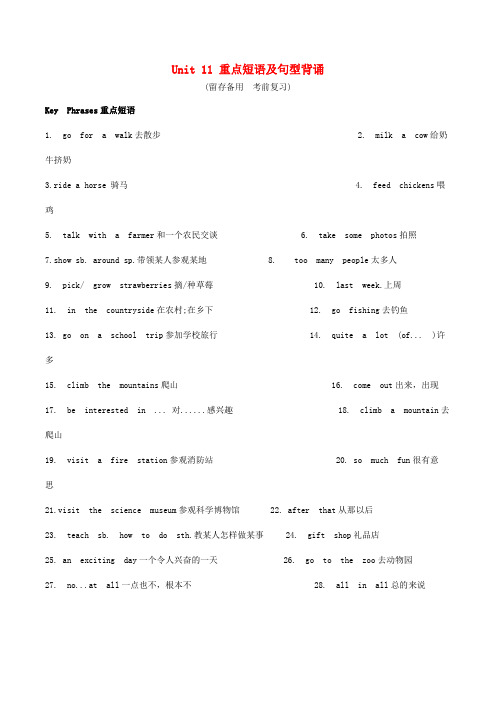
Unit 11 重点短语及句型背诵(留存备用考前复习)Key Phrases重点短语1. go for a walk去散步2. milk a cow给奶牛挤奶3.ride a horse 骑马4. feed chickens喂鸡5. talk with a farmer和一个农民交谈6. take some photos拍照7.show sb. around sp.带领某人参观某地 8. too many people太多人9. pick/ grow strawberries摘/种草莓 10. last week.上周11. in the countryside在农村;在乡下 12. go fishing去钓鱼13. go on a school trip参加学校旅行 14. quite a lot (of... )许多15. climb the mountains爬山 16. come out出来,出现17. be interested in ... 对......感兴趣 18. climb a mountain去爬山19. visit a fire station参观消防站 20. so much fun很有意思21.visit the science museum参观科学博物馆 22. after that从那以后23. teach sb. how to do sth.教某人怎样做某事 24. gift shop礼品店25. an exciting day一个令人兴奋的一天 26. go to the zoo去动物园27. no...at all一点也不,根本不 28. all in all总的来说29. learn a lot about ... 学了很多关....的知识Key Sentences 重点句型1. The farmer showed Carol around the farm. 这位农场主带领卡罗尔参观了农场。
2019-2020年人教版英语七年级下册Unit 11 How was your school tr
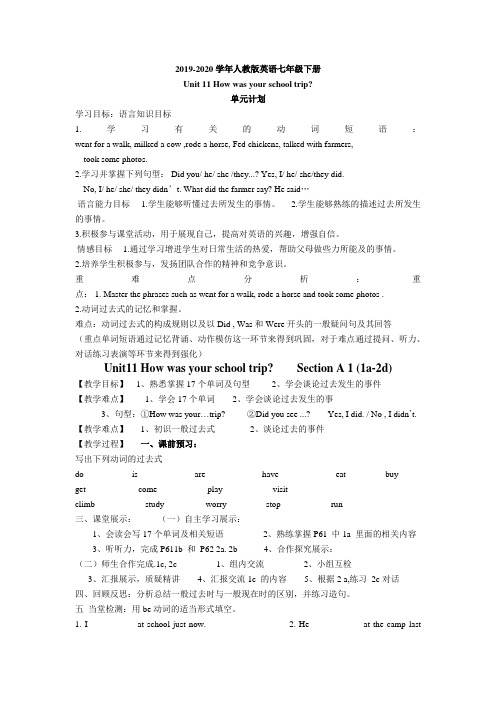
2019-2020学年人教版英语七年级下册Unit 11 How was your school trip?单元计划学习目标:语言知识目标1.学习有关的动词短语:went for a walk, milked a cow ,rode a horse, Fed chickens, talked with farmers,took some photos.2.学习并掌握下列句型: Did you/ he/ she /they...? Yes, I/ he/ she/they did.No, I/ he/ she/ they didn’t. What did the farmer say? He said…语言能力目标 1.学生能够听懂过去所发生的事情。
2.学生能够熟练的描述过去所发生的事情。
3.积极参与课堂活动,用于展现自己,提高对英语的兴趣,增强自信。
情感目标 1.通过学习增进学生对日常生活的热爱,帮助父母做些力所能及的事情。
2.培养学生积极参与,发扬团队合作的精神和竞争意识。
重难点分析:重点: 1. Master the phrases such as went for a walk, rode a horse and took some photos .2.动词过去式的记忆和掌握。
难点:动词过去式的构成规则以及以Did , Was 和 Were 开头的一般疑问句及其回答(重点单词短语通过记忆背诵、动作模仿这一环节来得到巩固,对于难点通过提问、听力、对话练习表演等环节来得到强化)Unit11 How was your school trip? Section A 1 (1a-2d)【教学目标】1、熟悉掌握17个单词及句型2、学会谈论过去发生的事件【教学难点】1、学会17个单词2、学会谈论过去发生的事3、句型:①How was your…trip? ②Did you see ...? Yes, I did. / No , I didn’t. 【教学难点】1、初识一般过去式2、谈论过去的事件【教学过程】一、课前预习:写出下列动词的过去式do______ is_______ are_______ have_______ eat____ buy_____ get______ come ______ play _____ visit______climb ______ study _____ worry_____ stop _____ run_____三、课堂展示:(一)自主学习展示:1、会读会写17个单词及相关短语2、熟练掌握P61 中1a 里面的相关内容3、听听力,完成P611b 和P62 2a. 2b4、合作探究展示:(二)师生合作完成.1c, 2c 1、组内交流2、小组互检3、汇报展示,质疑精讲4、汇报交流1c 的内容5、根据2 a,练习2c对话四、回顾反思:分析总结一般过去时与一般现在时的区别,并练习造句。
人教版七年级下册 Unit 11 How was your school trip 知识点(适合于听写 学生对照背诵)-带答案

人教版七年级下册Unit 11 How was your school trip 知识点1.把...喂给...用...喂养...以...为食...2.一个能干的农夫正在他的大农场耕作。
3.在农场周围散步4.许多/ 许许多多的5.我有很多事情要告诉你。
6.相当漂亮的一个女孩(quite / very )7.你知道关于他的一些事吗?8.带领某人参观某地9.show up / show off / on show10.看见一些有趣的事情11.从某人哪里学到很多关于12.名词前有哪些词时,无介词13.一名优秀的运动员在...方面优秀14.幸运的是,我们及时上了汽车。
15.一般过去时的标志词16.蛮好玩17.你说的太多了18.so many 和so much的区别19.很开心做某事20.担忧某事(worry)2种e out 的含义3种22.天气变得非常的晴朗。
23.长得很好/ 长大/种植水稻24.绘画/ 油画25.去旅行(2种)26.到...去旅行/ 去度假27.沿途/ 顺便问一下/ 以这种方式28.教我们如何制作机器人教某人如何做某事29.教某人某事30.我不知道去哪里/做什么/怎么做31.北京房子的价格很高。
32.总的来说33.让人兴奋的一天34.今天的学校旅行/五分钟的路程35.复合不定代词36.对...感兴趣/37.听到某人做某事/听到某人正在做某事38.不客气(all)39.作文构思40.你的学校旅行怎么样?41.去散步42.给奶牛挤奶43.骑马44.喂鸡45.与农民交谈46.拍一些照片47.带领Alice参观农场48.学习了很多关于农务49.从十二月到六月种植草莓50.摘一些草莓51.带他们回家52.你上周旅行怎么样?54.我去农村拜访我爷爷奶奶了。
55.你做什么了?56.我晚上观看星星了。
57.你真幸运。
58.你去动物园了吗?不,我没有。
我去了农场。
59.你看到一些牛了吗?是的,看到了。
我看到了很多。
七年级英语下册Unit 11 How was your school trip重点短语语法归纳
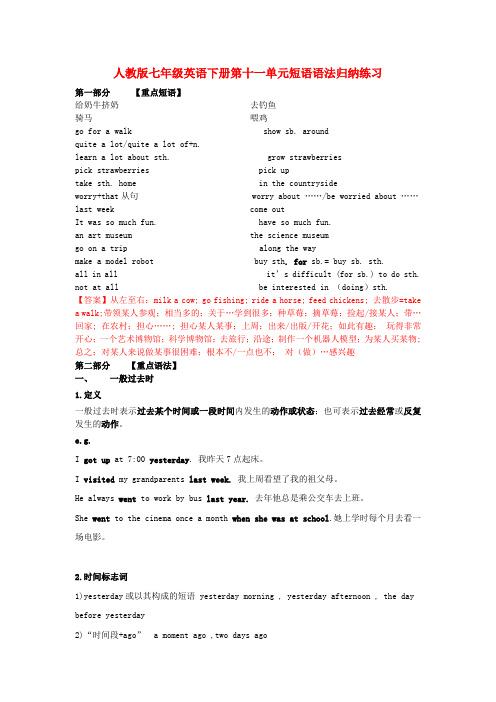
人教版七年级英语下册第十一单元短语语法归纳练习第一部分【重点短语】给奶牛挤奶去钓鱼骑马喂鸡go for a walk show sb. aroundquite a lot/quite a lot of+n.learn a lot about sth. grow strawberriespick strawberries pick uptake sth. home in the countrysideworry+that从句 worry about ……/be worried about ……last week come out It was so much fun. have so much fun. an art museum the science museumgo on a trip along the waymake a model robot buy sth. for sb.= buy sb. sth.all in all it’s difficult (for sb.) to do sth. not at all be interested in (doing)sth.【答案】从左至右:milk a cow; go fishing; ride a horse; feed chickens; 去散步=take a walk;带领某人参观;相当多的;关于…学到很多;种草莓;摘草莓;捡起/接某人;带…回家; 在农村;担心……; 担心某人某事;上周;出来/出版/开花;如此有趣;玩得非常开心;一个艺术博物馆;科学博物馆;去旅行;沿途;制作一个机器人模型;为某人买某物;总之;对某人来说做某事很困难;根本不/一点也不;对(做)…感兴趣第二部分【重点语法】一、一般过去时1.定义一般过去时表示过去某个时间或一段时间内发生的动作或状态;也可表示过去经常或反复发生的动作。
e.g.I got up at 7:00 yesterday. 我昨天7点起床。
七年级英语下册Unit11Howwasyourschooltrip说课稿(人教新目标版)
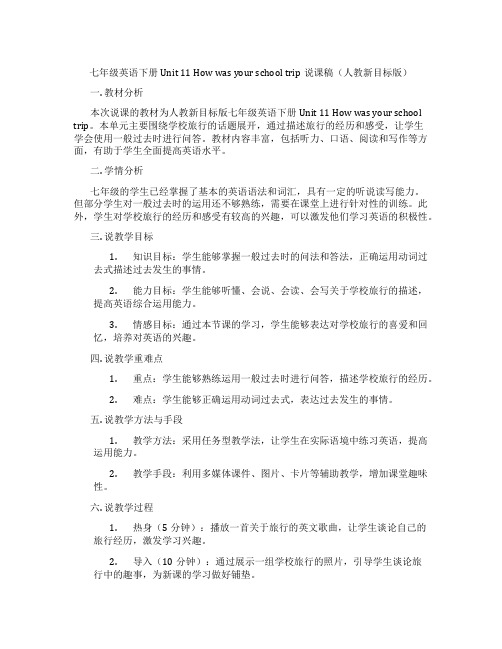
七年级英语下册 Unit 11 How was your school trip说课稿(人教新目标版)一. 教材分析本次说课的教材为人教新目标版七年级英语下册Unit 11 How was your school trip。
本单元主要围绕学校旅行的话题展开,通过描述旅行的经历和感受,让学生学会使用一般过去时进行问答。
教材内容丰富,包括听力、口语、阅读和写作等方面,有助于学生全面提高英语水平。
二. 学情分析七年级的学生已经掌握了基本的英语语法和词汇,具有一定的听说读写能力。
但部分学生对一般过去时的运用还不够熟练,需要在课堂上进行针对性的训练。
此外,学生对学校旅行的经历和感受有较高的兴趣,可以激发他们学习英语的积极性。
三. 说教学目标1.知识目标:学生能够掌握一般过去时的问法和答法,正确运用动词过去式描述过去发生的事情。
2.能力目标:学生能够听懂、会说、会读、会写关于学校旅行的描述,提高英语综合运用能力。
3.情感目标:通过本节课的学习,学生能够表达对学校旅行的喜爱和回忆,培养对英语的兴趣。
四. 说教学重难点1.重点:学生能够熟练运用一般过去时进行问答,描述学校旅行的经历。
2.难点:学生能够正确运用动词过去式,表达过去发生的事情。
五. 说教学方法与手段1.教学方法:采用任务型教学法,让学生在实际语境中练习英语,提高运用能力。
2.教学手段:利用多媒体课件、图片、卡片等辅助教学,增加课堂趣味性。
六. 说教学过程1.热身(5分钟):播放一首关于旅行的英文歌曲,让学生谈论自己的旅行经历,激发学习兴趣。
2.导入(10分钟):通过展示一组学校旅行的照片,引导学生谈论旅行中的趣事,为新课的学习做好铺垫。
3.新课呈现(15分钟):讲解一般过去时的问法和答法,示例说明如何用动词过去式描述过去发生的事情。
让学生跟读、模仿,确保正确掌握。
4.实践环节(15分钟):学生分角色扮演,模拟学校旅行的场景,运用一般过去时进行问答。
七年级英语人教版下册Unit11_第1课时教案(河南郑州)
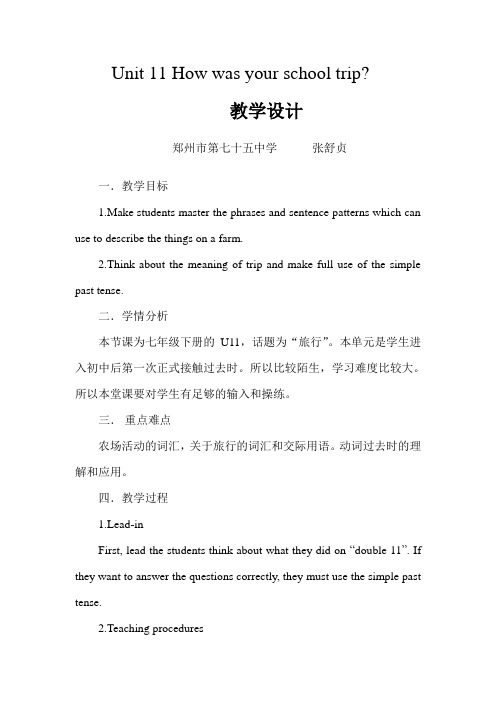
Unit 11 How was your school trip?教学设计郑州市第七十五中学张舒贞一.教学目标1.Make students master the phrases and sentence patterns which can use to describe the things on a farm.2.Think about the meaning of trip and make full use of the simple past tense.二.学情分析本节课为七年级下册的U11,话题为“旅行”。
本单元是学生进入初中后第一次正式接触过去时。
所以比较陌生,学习难度比较大。
所以本堂课要对学生有足够的输入和操练。
三.重点难点农场活动的词汇,关于旅行的词汇和交际用语。
动词过去时的理解和应用。
四.教学过程1.Lead-inFirst, lead the students think about what they did on “double 11”. If they want to answer the questions correctly, they must use the simple past tense.2.Teaching procedures(1) Guess what Carol did on her trip and learn the new phrases about farming.(2)Memorize the new phrases with the actions. Then play a game to see if they memorize these phrase well.(3)Listening practice 1b. Check the answers by asking and answering “Did….?Yes,…did/No,…didn’t”. Give students more pictures to practice the sentence pattens “Did…”(4)Listen to 2b and find more details. Then read the passage again to pay more attention to the past tense.(5)Discuss about the meaning of Carol’s trip and retell her trip.(with your mind-map)(6) Have an interview about teacher’s and their own trips.(7)Brainstorm: What can we get from the trip?五.HomeworkHave a diction about the new phrases and sentence patterns we learn in this class.。
河南省七年级英语下册Unit11Howwasyourschooltrip知识点归纳超级精简版
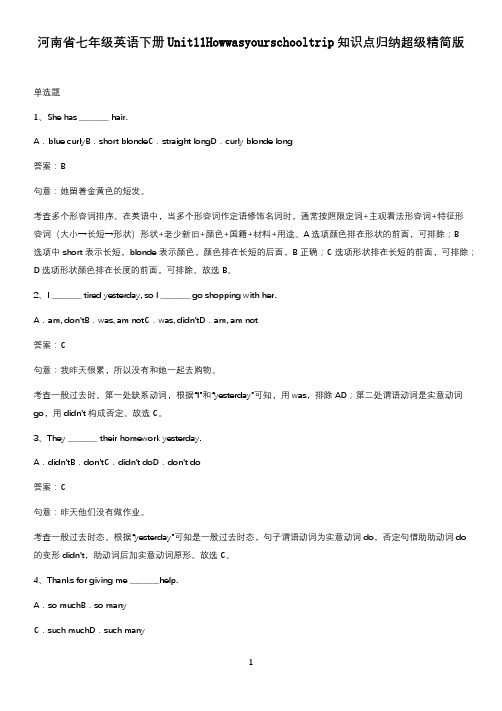
河南省七年级英语下册Unit11Howwasyourschooltrip知识点归纳超级精简版单选题1、She has ________ hair.A.blue curlyB.short blondeC.straight longD.curly blonde long答案:B句意:她留着金黄色的短发。
考查多个形容词排序。
在英语中,当多个形容词作定语修饰名词时,通常按照限定词+主观看法形容词+特征形容词(大小→长短→形状)形状+老少新旧+颜色+国籍+材料+用途。
A选项颜色排在形状的前面,可排除;B选项中short表示长短,blonde表示颜色,颜色排在长短的后面,B正确;C选项形状排在长短的前面,可排除;D选项形状颜色排在长度的前面,可排除。
故选B。
2、I ________ tired yesterday, so I ________ go shopping with her.A.am, don’tB.was, am notC.was, didn’tD.am, am not答案:C句意:我昨天很累,所以没有和她一起去购物。
考查一般过去时。
第一处缺系动词,根据“I”和“yesterday”可知,用was,排除AD;第二处谓语动词是实意动词go,用didn’t构成否定。
故选C。
3、They ________ their homework yesterday.A.didn’tB.don’tC.didn’t doD.don’t do答案:C句意:昨天他们没有做作业。
考查一般过去时态。
根据“yesterday”可知是一般过去时态,句子谓语动词为实意动词do,否定句借助助动词do的变形didn’t,助动词后加实意动词原形。
故选C。
4、Thanks for giving me ________help.A.so muchB.so manyC.such muchD.such many句意:谢谢你给我这么多帮助。
考查形容词短语。
2020年人教版七年级英语下册Unit11 How was your school trip 要点详解
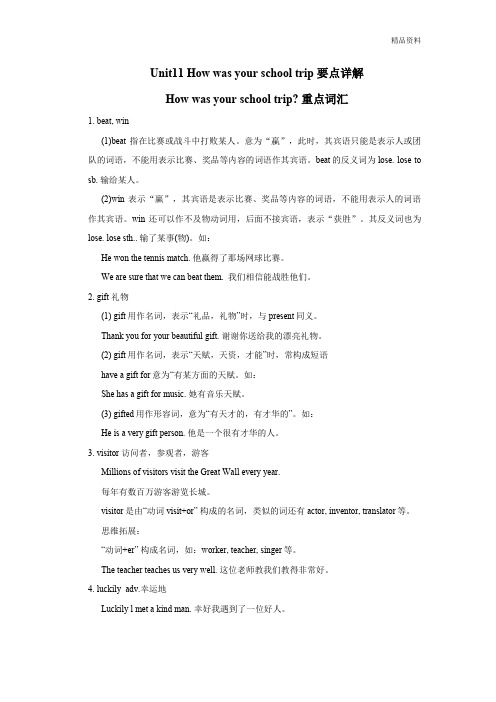
Unit11 How was your school trip 要点详解How was your school trip? 重点词汇1. beat, win(1)beat指在比赛或战斗中打败某人。
意为“蠃”,此时,其宾语只能是表示人或团队的词语,不能用表示比赛、奖品等内容的词语作其宾语。
beat的反义词为lose. lose to sb. 输给某人。
(2)win表示“赢”,其宾语是表示比赛、奖品等内容的词语,不能用表示人的词语作其宾语。
win还可以作不及物动词用,后面不接宾语,表示“获胜”。
其反义词也为lose. lose sth.. 输了某事(物)。
如:He won the tennis match. 他赢得了那场网球比赛。
We are sure that we can beat them. 我们相信能战胜他们。
2. gift 礼物(1) gift用作名词,表示“礼品,礼物”时,与present同义。
Thank you for your beautiful gift. 谢谢你送给我的漂亮礼物。
(2) gift用作名词,表示“天赋,天资,才能”时,常构成短语have a gift for意为“有某方面的天赋。
如:She has a gift for music. 她有音乐天赋。
(3) gifted用作形容词,意为“有天才的,有才华的”。
如:He is a very gift person. 他是一个很有才华的人。
3. visitor 访问者,参观者,游客Millions of visitors visit the Great Wall every year.每年有数百万游客游览长城。
visitor是由“动词visit+or”构成的名词,类似的词还有actor, inventor, translator等。
思维拓展:“动词+er”构成名词,如:worker, teacher, singer等。
The teacher teaches us very well. 这位老师教我们教得非常好。
2021年人教版七年级英语下册Unit11 How was your school trip要点详解
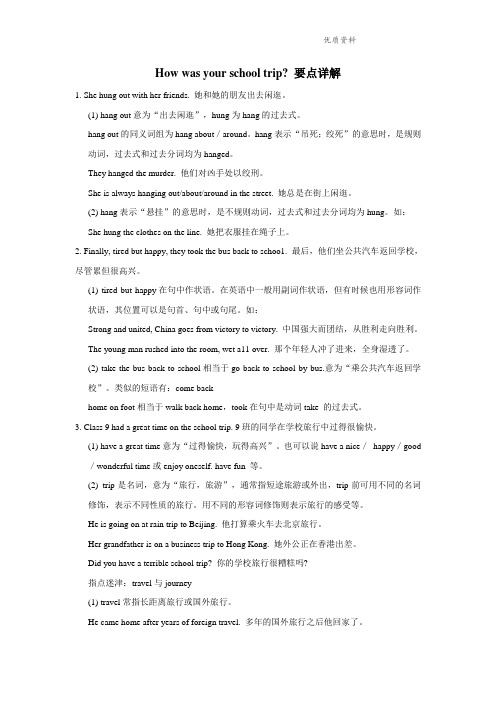
How was your school trip? 要点详解1. She hung out with her friends. 她和她的朋友出去闲逛。
(1) hang out意为“出去闲逛”,hung为hang的过去式。
hang out的同义词组为hang about/around。
hang表示“吊死;绞死”的意思时,是规则动词,过去式和过去分词均为hanged。
They hanged the murder. 他们对凶手处以绞刑。
She is always hanging out/about/around in the street. 她总是在街上闲逛。
(2) hang表示“悬挂”的意思时,是不规则动词,过去式和过去分词均为hung。
如:She hung the clothes on the line. 她把衣服挂在绳子上。
2. Finally, tired but happy, they took the bus back to schoo1. 最后,他们坐公共汽车返回学校,尽管累但很高兴。
(1) tired but happy在句中作状语。
在英语中一般用副词作状语,但有时候也用形容词作状语,其位置可以是句首、句中或句尾。
如:Strong and united, China goes from victory to victory. 中国强大而团结,从胜利走向胜利。
The young man rushed into the room, wet a11 over. 那个年轻人冲了进来,全身湿透了。
(2) take the bus back to school相当于go back to school by bus.意为“乘公共汽车返回学校”。
类似的短语有:come backhome on foot相当于walk back home,took在句中是动词take 的过去式。
3. Class 9 had a great time on the school trip. 9班的同学在学校旅行中过得很愉快。
人教版英语七年级下册Unit11Howwasyourschooltrip.教学设计
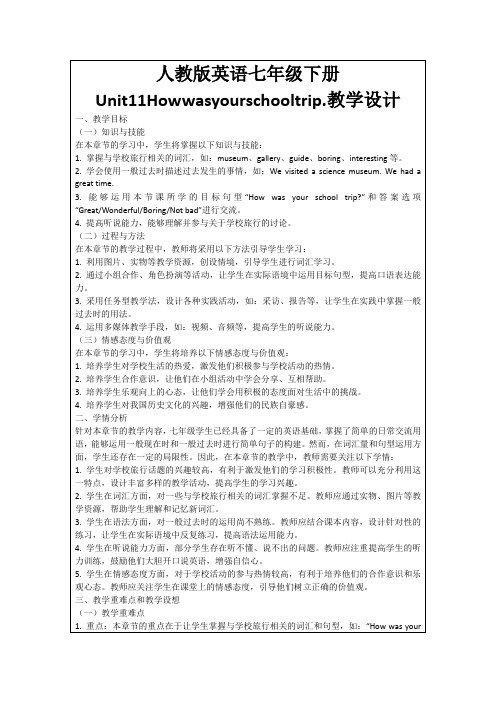
2.学生在词汇方面,对一些与学校旅行相关的词汇掌握不足。教师应通过实物、图片等教学资源,帮助学生理解和记忆新词汇。
3.学生在语法方面,对一般过去时的运用尚不熟练。教师应结合课本内容,设计针对性的练习,让学生在实际语境中反复练习,提高语法运用能力。
1.重点:本章节的重点在于让学生掌握与学校旅行相关的词汇和句型,如:“How was yourschool trip?”和答案选项“Great/Wonderful/Boring/Not bad”,并能运用一般过去时进行交流。
2.难点:
(1)一般过去时的运用,尤其是在描述过去发生的具体事件时,学生容易混淆时态。
2.口语作业:学生与家长或朋友进行一次关于学校旅行的英语对话,并录制下来。对话中需包含至少五个本节课学到的词汇和两个句型。
3.阅读作业:阅读一篇关于学校旅行的英文文章,并完成相应的阅读理解练习。文章将提供给学生,要求学生在阅读过程中注意理解一般过去时的运用。
4.词汇巩固:完成一份词汇练习,包括填空、选择、匹配等形式,旨在巩固本节课所学的与学校旅行相关的词汇。
4.学生在听说能力方面,部分学生存在听不懂、说不出的问题。教师应注重提高学生的听力训练,鼓励他们大ห้องสมุดไป่ตู้开口说英语,增强自信心。
5.学生在情感态度方面,对于学校活动的参与热情较高,有利于培养他们的合作意识和乐观心态。教师应关注学生在课堂上的情感态度,引导他们树立正确的价值观。
三、教学重难点和教学设想
(一)教学重难点
2.通过小组合作、角色扮演等活动,让学生在实际语境中运用目标句型,提高口语表达能力。
河南省七年级英语下册Unit11Howwasyourschooltrip知识点总结归纳
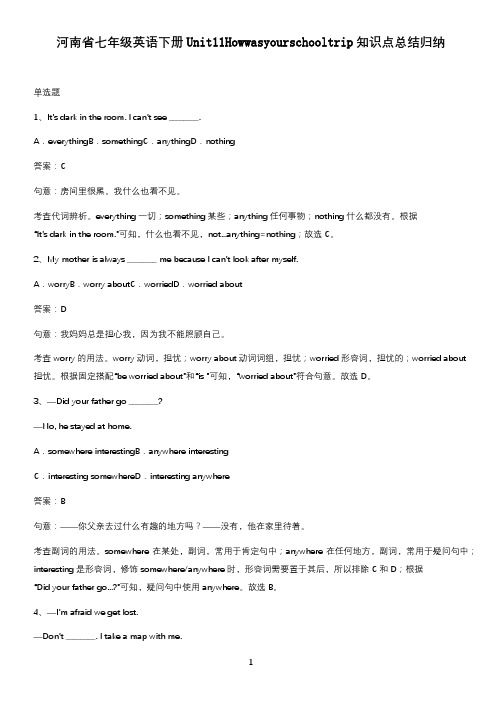
河南省七年级英语下册Unit11Howwasyourschooltrip知识点总结归纳单选题1、It’s dark in the room. I can’t see ________.A.everythingB.somethingC.anythingD.nothing答案:C句意:房间里很黑。
我什么也看不见。
考查代词辨析。
everything一切;something某些;anything任何事物;nothing什么都没有。
根据“It’s dark in the room.”可知,什么也看不见,not...anything=nothing;故选C。
2、My mother is always ________ me because I can’t look after myself.A.worryB.worry aboutC.worriedD.worried about答案:D句意:我妈妈总是担心我,因为我不能照顾自己。
考查worry的用法。
worry动词,担忧;worry about动词词组,担忧;worried形容词,担忧的;worried about担忧。
根据固定搭配“be worried about”和“is”可知,“worried about”符合句意。
故选D。
3、—Did your father go ________?—No, he stayed at home.A.somewhere interestingB.anywhere interestingC.interesting somewhereD.interesting anywhere答案:B句意:——你父亲去过什么有趣的地方吗?——没有,他在家里待着。
考查副词的用法。
somewhere在某处,副词,常用于肯定句中;anywhere在任何地方,副词,常用于疑问句中;interesting是形容词,修饰somewhere/anywhere时,形容词需要置于其后,所以排除C和D;根据“Did your father go...?”可知,疑问句中使用anywhere。
初中英语《Unit11 How was your school trip》优质课教案、教学设计
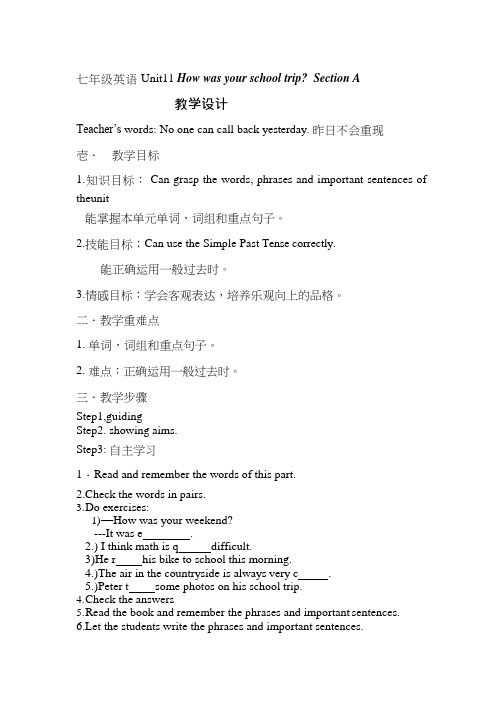
七年级英语Unit11 How was your school trip? Section A教学设计Teacher’s words: No one can call back yesterday. 昨日不会重现壱.教学目标1.知识目标:Can grasp the words, phrases and important sentences of theunit能掌握本单元单词,词组和重点句子。
2.技能目标;Can use the Simple Past Tense correctly.能正确运用一般过去时。
3.情感目标:学会客观表达,培养乐观向上的品格。
二.教学重难点1.单词,词组和重点句子。
2.难点:正确运用一般过去时。
三.教学步骤Step1,guidingStep2. showing aims.Step3: 自主学习1.Read and remember the words of this part.2.Check the words in pairs.3.D o exercises:1)—How was your weekend?---It was e .2.) I think math is q difficult.3)He r his bike to school this morning.4.)The air in the countryside is always very c .5.)Peter t some photos on his school trip.4.C heck the answers5.R ead the book and remember the phrases and important sentences.6.Let the students write the phrases and important sentences.7.C heck the answers.8.S tudents read and remember them, then the teacher asks about them. Step4.合作探究:一般过去时1. Students read and fill in the blanks,they can discuss in groups. Check the answers ,they can get 10 scores if they answer perffectly.3.Do exercises about it.1.定义:时间状语: yesterday, yesterday morning, last night, in 1995, three days ago…2.一般过去时的结构1.)B e 动词的一般过去时:a m/is —are —(1)肯定句式:主语+ + 其它.(2)否定句式:主语+ t+ 其它.(3)一般疑问句: + 主语+ 其它?Exercises:肯定句:The air was clean yesterday.否定句:一般疑问句:特殊疑问句:2.)行为动词(v.)的一般过去时态(1)肯定句式:主语+ + 其它.(2)否定句式:主语+ + + 其它.(3)一般疑问句:+ 主语+ + 其它?肯定回答:Y es,主语+ .否定回答:N o,主语+ .Exercises:肯定句:I rode a horse last Sunday.否定句:I a horse last Sunday.一般疑问句:you a horse last Sunday?特殊疑问句:(1))you do last Sunday?(2))did you a horse?3.)动词过去式的构成1. 规则变化口诀:2.不规则变化:Step5 Pairwork: talk show (就你的旅行进行对话)Step6 Have a test1.W rite down the answers.2.e xchange the papers and check, give the scores.3.S how the scores of each group to see: Which groups are winners?(一)用所给动词的适当形式填空。
人教版新目标七年级下学期Unit-11-How-was-your-school-trip.知识点讲解
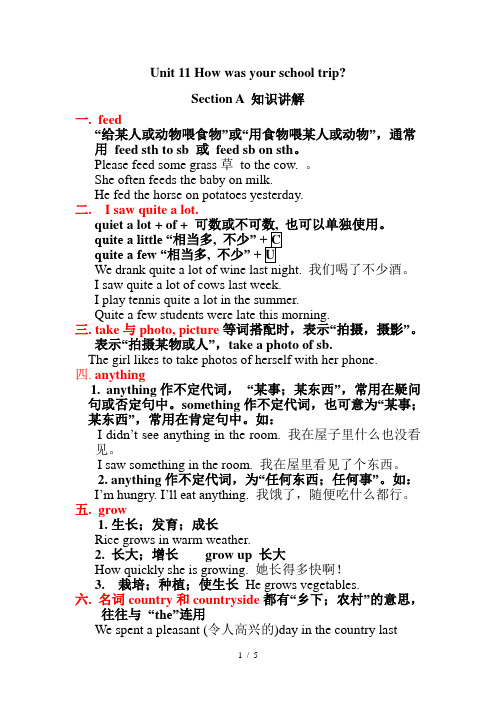
Unit 11 How was your school trip?Section A 知识讲解一.feed“给某人或动物喂食物”或“用食物喂某人或动物”,通常用feed sth to sb 或feed sb on sth。
Please feed some grass草to the cow. 。
She often feeds the baby on milk.He fed the horse on potatoes yesterday.二. I saw quite a lot.quiet a lot + of + 也可以单独使用。
quite a little “相当多, 不少quite a few “相当多, 不少我们喝了不少酒。
I saw quite a lot of cows last week.I play tennis quite a lot in the summer.Quite a few students were late this morning.三. take与photo, picture等词搭配时,表示“拍摄,摄影”。
表示“拍摄某物或人”,take a photo of sb.The girl likes to take photos of herself with her phone.四. anything1. anything作不定代词,“某事;某东西”,常用在疑问句或否定句中。
something作不定代词,也可意为“某事;某东西”,常用在肯定句中。
如:I didn’t see anything in the room. 我在屋子里什么也没看见。
I saw something in the room. 我在屋里看见了个东西。
2. anything作不定代词,为“任何东西;任何事”。
如:I’m hungry. I’ll eat anything. 我饿了,随便吃什么都行。
五.grow1.生长;发育;成长Rice grows in warm weather.2. 长大;增长grow up 长大How quickly she is growing. 她长得多快啊!3. 栽培;种植;使生长He grows vegetables.六. 名词country和countryside都有“乡下;农村”的意思,往往与“the”连用We spent a pleasant (令人高兴的)day in the country lastweekend.但country可置于名词前做定语,而countryside一般不这么用。
人教版英语七年级下册Unit11HowwasyourschooltripⅢ课时教学设计

三、教学重难点和教学设想
(一)教学重难点
1.重点:本章节的教学重点是让学生熟练运用一般过去时态的疑问句和否定句,描述学校旅行的经历,以及掌握与学校旅行相关的词汇和表达。
2.能够运用一般过去时态的疑问句和否定句,询问和回答过去的事情,如:“What did you do?”, “Where did you go?”, “How was your school trip?”等。
3.能够听懂、读懂并运用与学校旅行相关的词汇和表达,如:museum, gallery, church, castle, guide, souvenir等。
4.各小组汇报调查结果,教师给予评价和反馈,鼓励学生积极参与。
(五)总结归纳
1.教师引导学生回顾本节课所学内容,总结一般过去时态疑问句和否定句的结构及用法。
2.学生分享自己在课堂上的收获和感受,教师给予肯定和鼓励。
3.教师强调学校旅行中应注意的跨文化意识和环保意识,提醒学生将这些意识融入日常生活。
4.布置课后作业,要求学生运用一般过去时态描述一次自己的旅行经历,巩固所学知识。
五、作业布置
为了巩固本章节所学知识,培养学生的语言运用能力,特布置以下作业:
1.写作练习:请运用一般过去时态,描述一次你的学校旅行经历。要求至少使用5个过去式动词,并包含疑问句和否定句。字数在80-100词左右。
提示:你可以从以下几个方面进行描述:
a.旅行的时间和地点
b.参加的活动和所见所闻
c.旅行中的有趣或难忘的事情
郑州市七年级英语下册Unit11Howwasyourschooltrip总结(重点)超详细
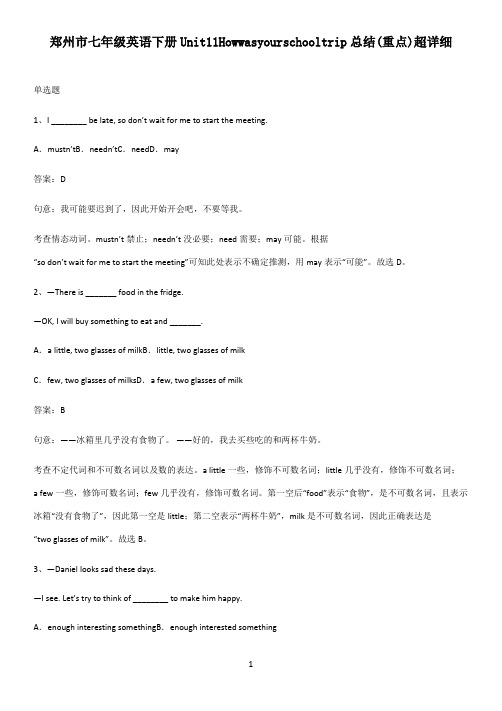
郑州市七年级英语下册Unit11Howwasyourschooltrip总结(重点)超详细单选题1、I ________ be late, so don’t wait for me to start the meeting.A.mustn’tB.needn’tC.needD.may答案:D句意:我可能要迟到了,因此开始开会吧,不要等我。
考查情态动词。
mustn’t禁止;needn’t没必要;need需要;may可能。
根据“so don’t wait for me to start the meeting”可知此处表示不确定推测,用may表示“可能”。
故选D。
2、—There is _______ food in the fridge.—OK, I will buy something to eat and _______.A.a little, two glasses of milkB.little, two glasses of milkC.few, two glasses of milksD.a few, two glasses of milk答案:B句意:——冰箱里几乎没有食物了。
——好的,我去买些吃的和两杯牛奶。
考查不定代词和不可数名词以及数的表达。
a little一些,修饰不可数名词;little几乎没有,修饰不可数名词;a few一些,修饰可数名词;few几乎没有,修饰可数名词。
第一空后“food”表示“食物”,是不可数名词,且表示冰箱“没有食物了”,因此第一空是little;第二空表示“两杯牛奶”,milk是不可数名词,因此正确表达是“two glasses of milk”。
故选B。
3、—Daniel looks sad these days.—I see. Let’s try to think of ________ to make him happy.A.enough interesting somethingB.enough interested somethingC.something interesting enoughD.something interested enough答案:C句意:——丹尼尔这些天看起来很伤心。
河南省七年级英语下册Unit11Howwasyourschooltrip知识点汇总
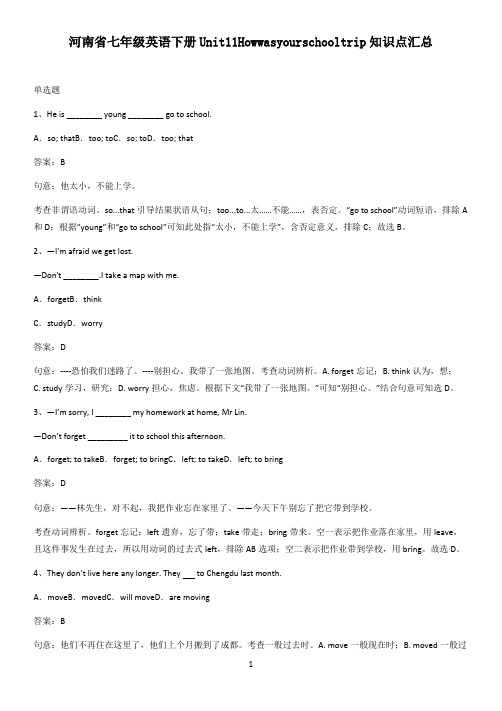
河南省七年级英语下册Unit11Howwasyourschooltrip知识点汇总单选题1、He is ________ young ________ go to school.A.so; thatB.too; toC.so; toD.too; that答案:B句意:他太小,不能上学。
考查非谓语动词。
so...that引导结果状语从句;too...to...太……不能……,表否定。
“go to school”动词短语,排除A 和D;根据“young”和“go to school”可知此处指“太小,不能上学”,含否定意义,排除C;故选B。
2、—I'm afraid we get lost.—Don't ________.I take a map with me.A.forgetB.thinkC.studyD.worry答案:D句意:----恐怕我们迷路了。
----别担心。
我带了一张地图。
考查动词辨析。
A. forget忘记;B. think认为,想;C. study学习,研究;D. worry担心,焦虑。
根据下文“我带了一张地图。
”可知“别担心。
”结合句意可知选D。
3、—I’m sorry, I ________ my homework at home, Mr Lin.—Don’t forget _________ it to school this afternoon.A.forget; to takeB.forget; to bringC.left; to takeD.left; to bring答案:D句意:——林先生,对不起,我把作业忘在家里了。
——今天下午别忘了把它带到学校。
考查动词辨析。
forget忘记;left遗弃,忘了带;take带走;bring带来。
空一表示把作业落在家里,用leave,且这件事发生在过去,所以用动词的过去式left,排除AB选项;空二表示把作业带到学校,用bring。
- 1、下载文档前请自行甄别文档内容的完整性,平台不提供额外的编辑、内容补充、找答案等附加服务。
- 2、"仅部分预览"的文档,不可在线预览部分如存在完整性等问题,可反馈申请退款(可完整预览的文档不适用该条件!)。
- 3、如文档侵犯您的权益,请联系客服反馈,我们会尽快为您处理(人工客服工作时间:9:00-18:30)。
郑州市七年级英语下册Unit11Howwasyourschooltrip重难点归纳单选题1、There is ________ wrong with my computer. It doesn’t work. A.somethingB.nothingC.anythingD.everything答案:A句意:我的电脑出问题了,它不工作了。
考查复合不定代词。
something某事(物);nothing没有什么;anything任何事(物);everything一切。
根据“It doesn’t work.”可知电脑出问题了;There’s something wrong with…“……出问题”。
故选A。
2、My shoes ________ under the bed just now. But they ________ there now.A.are; weren’tB.were; weren’tC.were; aren’t答案:C句意:我的鞋子刚才在床底下。
但是它们现在不在那里了。
考查动词时态。
根据“just now”可知,前半句时态为一般过去时,主语为“My shoes”,be动词要用were,排除A 项;再根据“now”可知,后半句时态为一般现在时,再由“but”可推知,鞋子不在床下了,be动词用aren’t。
故选C。
3、—The classroom is so clean. Who _________ it?—Tom and Jack did.A.is cleaningB.cleansC.will cleanD.cleaned答案:D句意:——教室很干净。
谁打扫的?——汤姆和杰克打扫的。
考查动词时态。
根据“Tom and Jack did.”可知,此处描述过去发生的动作,使用一般过去时,故选D。
4、Thanks for giving me ________help.A.so muchB.so manyC.such muchD.such many答案:A句意:谢谢你给我这么多帮助。
考查形容词短语。
“这么多”只能说“so much/so many ”,不能说“such much/many ”;so much修饰不可数名词,so many修饰可数名词复数。
Helpa(帮助)是不可数名词,故用so much;选A。
5、—Is there ________ important in today's newspaper?—Yes,quite a lot.A.everythingB.every thingC.nothingD.anything答案:D句意:----今天的报纸上有什么重要的东西吗?----是的,很多。
考查不定代词。
A. everything一切,所有东西,所有事情;B. every thing每一件事;C. nothing没有事物,没有东西;D. anything任何东西,任何事情,一般用于疑问句和否定句中。
本句是一般疑问句,结合句意可知填anything;选D。
6、He ________ a lot of food and drinks yesterday.A.buysB.boughtC.buyD.to buy答案:B句意:他昨天买了很多食物和饮料。
考查一般过去时。
根据“yesterday”可知应用一般过去时,谓语动词应用动词过去式,故选B。
7、—Lucy is a really ________ girl.—Yes. She gets a good job in a big company(公司).A.luckB.luckyC.unluckyD.luckily答案:B句意:——Lucy真的是一个幸运的女孩。
——是的。
她在一家大公司找到一份好工作。
考查词义辨析。
luck幸运,名词;lucky幸运的,形容词;unlucky不幸运的,形容词;luckily幸运地,副词。
此空修饰名词girl,应用形容词作定语。
根据“She gets a good job in a big company”可知,得到了一份好工作是一件幸运的事,故选B。
8、It’s dark in the room. I can’t see ________.A.everythingB.somethingC.anythingD.nothing答案:C句意:房间里很黑。
我什么也看不见。
考查代词辨析。
everything一切;something某些;anything任何事物;nothing什么都没有。
根据“It’s dark in the room.”可知,什么也看不见,not...anything=nothing;故选C。
9、________ some extra support is given, the company will close down. A.IfB.UnlessC.SinceD.Whenever答案:B句意:除非给予额外支持,否则这家公司将倒闭。
考查连词辨析。
if如果;unless除非;since自从;whenever无论何时。
根据“some extra support is given, the company will close down”可知,除非给予这家公司支持,否则它会倒闭,故选B。
10、There ________ many people here on vacation last winter because the COVID-19 pandemic(新冠疫情) didn’t end.A.wereB.wasC.aren’tD.weren’t答案:D句意:去年冬天这里没有很多人度假,因为新冠疫情没有结束。
考查there be句型及时态。
根据“many p eople”和“last winter”及“...because the COVID-19 pandemic (新冠疫情)didn’t end.”可知,因为有疫情,所以应是没有多少人度假,此处时态为一般过去时,主语是many people,应用weren’t,表示否定。
故选D。
11、He put his book down and ________ me pick up my pen.A.helpB.helpedC.helpsD.helping答案:B句意:他放下书,帮我拿起钢笔。
考查一般过去时。
根据“He put his book down”可知,时态是一般过去时,此处作并列谓语,也应使用过去式,故选B。
12、—Mom, can you teach me how ________ noodles?—Sure. It’s easy.A.cookB.cooksC.to cookD.cooking答案:C句意:-----妈妈,你能教我怎么做面条吗?-----当然。
很简单。
特殊疑问词+动词不定式:相当于名词性短语;例如,how to do sth.:怎样做某事。
结合句意可知填to cook;选C。
13、—Where ________ the cake I bought yesterday?—I ________ it. Can you buy one more?A.is; eatB.was; ateC.is; ateD.was; eat答案:C句意:——我昨天买的蛋糕在哪儿?——我吃了,你可以再买一个吗?考查一般过去时和一般现在时。
根据“Where…the cake I bought yesterday?”可知,他问的是蛋糕现在在哪儿,第一个空应用一般现在时,用is,则B、D两项错误;根据句意可知,吃蛋糕的动作发生在过去,因此第二个空应用一般过去时,用ate,则A项错误。
故选C。
14、All of the students were _______ about the _______ football match.A.exciting; excitedB.excited; excitingC.excited; excitedD.exciting; exciting答案:B句意:所有的学生都对这场激动人心的足球比赛感到兴奋。
考查形容词辨析。
exciting激动人心的,修饰物;excited激动的。
第一处修饰人“All of the students”,第二处修饰物“football match”,故选B。
15、I _________ the old man carefully, but I _________ anything.A.listened to; didn’t hearB.heard; didn’t listen toC.listened to; heardD.heard; listened to答案:A句意:我认真听那位老人说话,但我什么也没听见。
考查动词的词义辨析。
listen to sb.表示“听某人说话”,强调听的动作,其过去式为listened;hear表示“听见……”,强调听到的内容,其过去式为heard。
根据连词but及语境可知but连接两个一般过去时的并列分句,可知第一个分句表示听的动作,第二个分句则表示听到的内容。
因此第一空用 listen to的过去式listened to,第二空表示“没有听到任何东西”,故第二空填didn’t hear。
故选A。
语法填空16、“I really don’t know what has happened.” ________ Tiffany sadly. (reply)答案:replied句意:蒂芙尼悲伤地回答:“我真不知道发生了什么事。
”根据语境可知,此句时态宜用一般过去时,reply的过去式replied。
故填replied。
17、Jack finally ____________(fall)asleep when the wind was dying down at midnight.答案:fell句意:午夜风渐渐减弱时,杰克终于睡着了。
fall asleep入睡,动词短语。
本句为when引导的时间状语从句,结合句中was dying down及语境可知,午夜风减弱时,杰克终于睡着了,即从句为过去进行时,主句应为一般过去时,故此处应用所给动词的过去式fell。
故答案为fell。
18、Thanks for _________(invite)me to your birthday party.答案:inviting句意:感谢邀请我参加你的生日派对。
thanks for doing sth.“感谢做某事”,固定搭配。
故填inviting。
19、The teacher _________ (tell) the children __________ (sit) down quietly just now.答案: told to sit句意:老师刚才告诉孩子们安静地坐下来。
